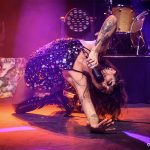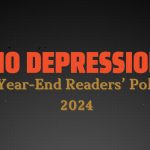THE READING ROOM: Sylvie Simmons on Music Memoirs and Surprises While Writing

Photo by Tod Regan

Simmons’ vivid songwriting arises from a life of reading and writing. Her acclaimed biography of Leonard Cohen, I’m Your Man: The Life of Leonard Cohen, has been translated into 25 languages and remains the definitive biography of Cohen. Simmons has also written a biography of Serge Gainsbourg (Serge Gainsbourg: A Fistful of Gitanes), Neil Young (Neil Young: Reflections in Broken Glass), a collection of short fiction (Too Weird for Ziggy), and she most recently collaborated with Debbie Harry on Harry’s autobiography, Face It.
I caught up by phone with Simmons recently for a chat about books and reading.
What music books are on your nightstand, or sitting next to you favorite reading chair, now?
There’s usually a few music books I’ve been sent to review. The most recent, finished but still by the bed, is Kathy Valentine’s All I Ever Wanted: A Rock ’n’ Roll Memoir. There’s also a pile of books that are not about music — novels, poems — that I’ve been planning to read but haven’t gotten to.
What qualities do you look for in a music book? That is, when you read, are you hoping to be moved emotionally, intellectually, or by the beauty of the writing?
Two out of three ain’t bad, but really I’d like all three. If it’s a memoir, what I’m really looking for is an authentic voice, something that doesn’t feel steered or manipulated by an editor or someone behind the curtain. If it’s a biography, I like to feel that the writer has dug deep and filled in those gaps left by earlier biographers.
Can you name a book you have bought for the cover?
As a kid, there’s tons of them. Books and albums, too. The first book that comes to mind that falls into that category is Anthony Burgess’ A Clockwork Orange.
Are there one or two books for which you are an evangelist, that you feel so passionately about that you want everyone to read?
Bob Dylan’s Chronicles: Volume One. So surprisingly revelatory. Patti Smith’s elegiac Just Kids, which is also one of those books I would have bought just for the cover even if I hadn’t known who she was. And all of Leonard Cohen’s early books of poetry.
What is your ideal reading experience? For example, do you like to read in the mornings at the kitchen table with a cup of tea? Do you prefer to read print or e-books?
I like to read physical books, same as I like to listen to physical copies of albums. Part of the experience is tactile — holding the book has an intimacy to it and almost demands I focus on it. Reading on a screen does not. I tend to read at night more than daytime. I’m always afraid that if I start reading in the morning, I’ll never put the book down and get on with my work.
Who are your top five authors?
I’m not one for list-keeping. But in the case of musicians who are writers, it’s hard to go wrong with Bob Dylan, Patti Smith, Nick Cave, Viv Albertine, and (though his memoir is still a work in progress; what I’ve read of it is wonderful) Americana artist Jim White.
What book do you want to read again as if for the first time?
The first thing that came to mind was a memory of when I was very young, picking up Lord of the Flies. I remember being rapt. Enthralled. “Maybe there is a beast … maybe it’s only us.”
I wonder how it would feel reading it now, during the Trump regime and the pandemic and what seems to be the impossibility of a people being able to come together for the common good.

Writing a book about someone is about uncovering — getting to the bottom of who and what they are. If you dig deep, there’s always some treasure that gets unearthed. Writing I’m Your Man: The Life of Leonard Cohen, those surprises ranged from the sublime to the ridiculous. Finding out that Cohen was a ukulele player in his youth was pretty sublime to me, being a ukulele player! Cohen was pretty instrumental into my “coming out” as a singer-songwriter. For one thing, touring around the world with the book and my uke singing his songs cured me of the stage fright that stopped me pursuing a career on that side of the music business in my late teens. On a less personal level, discovering that Cohen had not been cured of depression by his five years of living in a hut in a Buddhist monastery but that he was so deeply depressed he sought out another guru and flew to India was a real revelation. As was that he liked to wash down a McDonald’s Filet-O-Fish with a glass of good Margaux!
You’re hosting a dinner party, and you can invite five authors living or dead; whom would you invite?
I’m going to step out of the music world for a moment, though I will still invite Bob Dylan. I’m sure he’ll get along fine with James Joyce, who’s way up on my list. Also Gabriel García Márquez, Flannery O’Connor, and Virginia Woolf.




